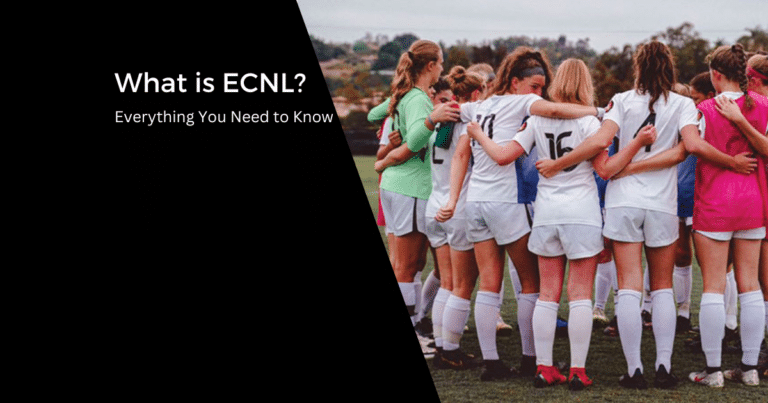You Aren’t a D1 Lock If You Play MLS NEXT, ECNL, NAL or GA
Real talk. I know you’re proud of playing in MLS NEXT, ECNL, NAL, or GA – and you should be! These leagues have produced many talented college and professional players.
But here’s the cold hard truth that might be hard to hear: just because you play in one of these leagues doesn’t automatically mean you’re destined for Division 1 soccer.
TL;DR:
The Reality Check
Think about it this way: There are hundreds of teams across these leagues, with roughly 20 players per team. That’s thousands of players in your age group alone.
Now consider that D1 programs typically bring in only 6-10 recruits per class. The math simply doesn’t math for everyone to play D1.
Your league isn’t a golden ticket – it’s just one piece of the puzzle.
What really matters is how you’re performing within that platform and, more importantly, what you’re doing beyond just showing up to games.
What Actually Makes a D1 Prospect?
Let’s break down what college coaches are really looking for:
Consistent Excellence
It’s not enough to just be on the roster. Are you a regular starter? Are you making meaningful contributions in games?
Coaches want to see that you’re not just surviving at this level but thriving. They’re looking for players who consistently stand out, even among other elite players.
Physical Readiness
D1 soccer is incredibly demanding. Your technical skills might be sharp, but coaches need to know you can handle the physical demands of the college game. This means you need to be working on:
- Speed and explosiveness
- Strength and power
- Endurance and recovery
- Injury prevention
All of this matters at the next level.
Technical Precision Under Pressure
Yes, you’re playing amongst the best in your age group, but how clean is your first touch when you’re under immediate pressure? How accurate are your passes when you’re fatigued in the 80th minute? What happens if you turn the ball over? Do you fight to get it back or hang your head?
Division 1 coaches are looking for tenacity and technical consistency even in the most challenging situations.
The Extra Mile: What Sets Commits Apart
Want to know what successful D1 recruits are doing? Here’s your blueprint:
Proactive Communication
They’re not waiting for coaches to find them. They’re:
- Sending well-crafted emails with specific details about their achievements
- Following up with updates on their development
- Attending ID camps at schools they’re seriously interested in
- Building relationships with coaching staffs early in the process
Video Presence
They maintain:
- An updated highlight reel that shows their best moments
- Full game footage that demonstrates consistency
- Regular updates to their recruiting profiles
Academic Excellence
This is non-negotiable. Strong grades and test scores:
- Give coaches more flexibility with scholarship money
- Show you can handle the demands of being a student-athlete
- Demonstrate your commitment to excellence in all areas
I’ve seen coaches pass on a couple of very talented players because their grades were awful (under 1.5).
Year-Round Development
The most successful recruits are:
- Training outside of regular team practices
- Working with strength and conditioning coaches
- Playing pickup games to develop creativity
- Studying the game through film analysis
- Taking care of their bodies through proper nutrition and rest
- Consistently building their network (other players, coaches, etc.)
The Right Mindset
Instead of thinking “I play [MLS NEXT, ECNL, NAL, GA] so I’m definitely going D1,” shift your mindset to:
“I’m fortunate to play in a league that gives me the opportunity to develop into a D1 player if I put in the work. I’m going to take advantage of every day and minute.”
Remember, playing in a top league means you have great exposure and competitive games. It means you have the platform to showcase your abilities. But it’s what you do with that platform that matters.
Don’t squander your opportunity. It’s hard enough to play at your level.
The Path Forward
If D1 college is your goal, here’s your quick action plan:
- Honestly evaluate where you stand in your current team and league
- Identify specific areas where you need to improve
- Create a development plan that goes beyond team training
- Start building your recruiting profile and reaching out to schools
- Keep your grades up – they matter more than you think
- Stay humble and very hungry – there’s always room to improve
Your league affiliation is a fantastic starting point, but it’s just that – a starting point. The path to D1 is about what you do with the opportunities in front of you.
So get to work.
Your spot on a Division 1 roster won’t be handed to you because of the league you play in – you’ll have to earn it through dedication, development, and determination.
Remember: The best players aren’t just part of elite leagues; they’re the ones maximizing every opportunity those leagues provide.
Featured Image Source: https://clemsontigers.com/clemson-mens-soccer-media-resources/

Written By: SoccerNovo
SoccerNovo is an independent youth soccer media brand built to help parents, players, and coaches better understand the game and the pathways available in U.S. soccer. Our mission is to make youth soccer simpler, clearer, and more accessible for everyone involved in it.
Let’s connect





